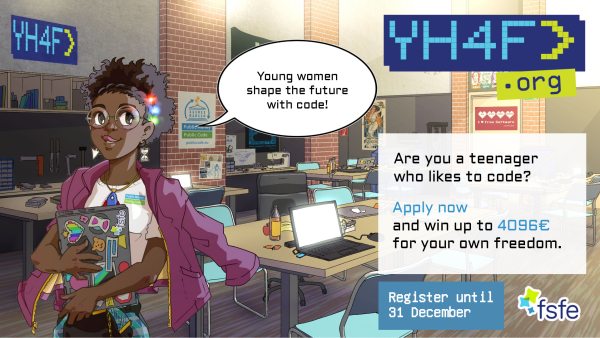 Registration for for the second edition of “Youth Hacking 4 Freedom “, the Free Software Foundation Europe’s hacking competition for teenagers from all over Europe, has opened. The contest offers young people aged between 14 and 18 the opportunity to challenge themselves, meet like-minded people and win cash prizes of €4,096, €2048 and €1024.
Registration for for the second edition of “Youth Hacking 4 Freedom “, the Free Software Foundation Europe’s hacking competition for teenagers from all over Europe, has opened. The contest offers young people aged between 14 and 18 the opportunity to challenge themselves, meet like-minded people and win cash prizes of €4,096, €2048 and €1024.
Registration is open until 31 December, after which the six-month coding phase will start, ending at the end of June 2023.

YH4F aims to inspire young people by giving them the chance to hack on a software project in a fair and fun way while meeting other young developers from all around Europe. The winners will receive a cash prize and a two-day trip to Brussels with other hackers for the award ceremony.
The first edition of the competition was a huge success with broad participation and well-coded winning projects. Over a hundred people coming from 25 different countries registered and submitted 35 project at the end of a five-month coding phase. The six winning entries offered sign language transcription, a smart table robot, a personal assistant, a music tutorial, a file sharing program and a homework manager. All the programs are licensed under free software licences, thus granting everybody the right to use, understand, share and improve them.
Ekaterina, one of the winners of the first edition of the YH4F competition, states: “Taking part in this competition was personally a big step as before it I have never ever programmed something and I did not have knowledge to do so. During the project I learned a lot more about programming concepts, how can I implement the modules and generally the programming language Python“.
To be eligible to enter participants must be between 14 and 18 years old and live in a European country. The YH4F competition includes an introductory online event in which the FSFE team will present the competition and answer questions about it. Participants are free to use their imagination to the competition as any type of software can be coded as long as it is free software. The projects submitted can therefore be stand-alone programs written from scratch or a modification and combination of existing programs, in addition to which participants will be able to follow each other’s work and exchange ideas.
Projects will be submitted to the expert jury at the end of June 2023.